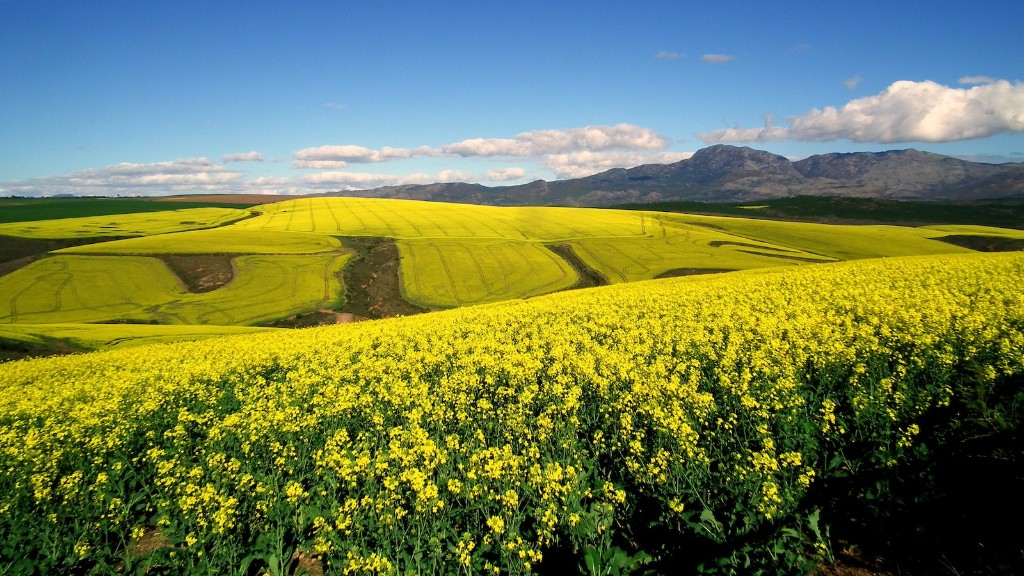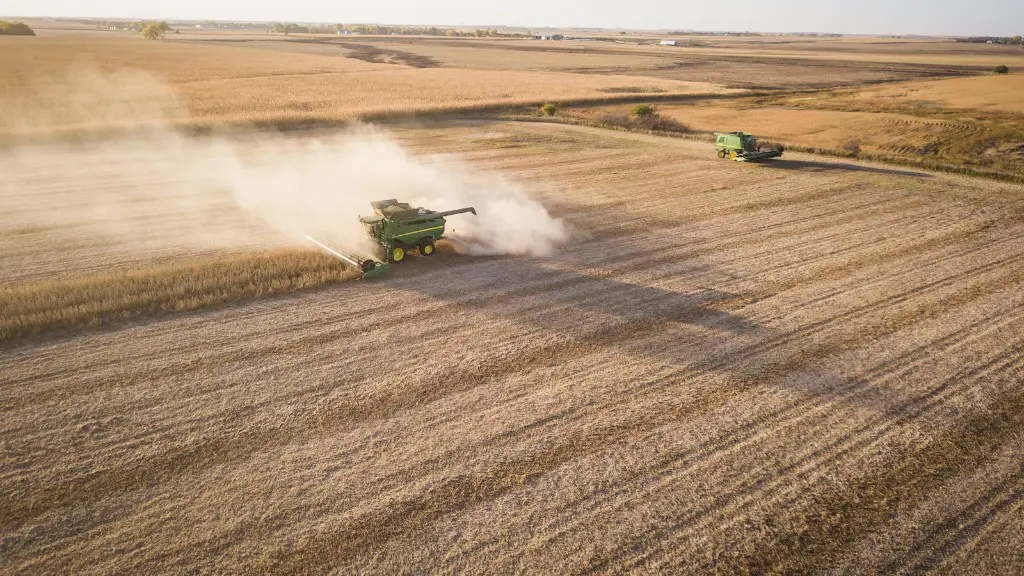Sustainable agriculture quizlet is a concept of agriculturally-based practices that are aimed at preserving and improving the environment. It makes use of natural resources that are renewable and helps to reduce negative impacts upon the environment. This type of agriculture can be applied to some farms, or to an entire region, and goes beyond the typical scope of conventional farming methods. Sustainable agriculture strives to take a holistic approach to managing land, livestock, crops, and resources in order to reduce the long-term impact on the environment.
The key objectives of sustainable agriculture quizlet are to minimize the use of synthetic fertilizers, pesticides, and other pollutants; to maximize long-term productivity of soil; to create and maintain healthy ecosystems; to conserve and restore soils, wetlands, and biodiversity. Sustainable agriculture aims to enhance the interactions between humans, plants and environment to achieve the best possible use of resources. Sustainable agricultural practices help to protect soil from degradation, preserve and improve water quality, and promote wildlife habitats.
Sustainable agriculture quizlet focuses on the sustainability of soil, natural resources and the farming of crops through proper use of manure, compost, irrigation management and other methods. It also encourages an integrated approach to farming, which includes integrating crop rotation, animal husbandry and land management. The practices of sustainable agriculture may also include an integrated pest management plan, crop diversification, and natural fertilizers to minimize environmental impacts.
Sustainable agriculture is different from conventional farming in that it focuses on a long-term, holistic approach to management and emphasizes sustainability through conservation and preservation of resources. Through sustainable agricultural practices, farmers can ensure that their land is productive, while ensuring that the environment is not significantly harmed by the process. These actions can take the form of land management, conservation of resources, and sustainable use of energy. For example, some sustainable farms use solar energy, while others use wind or water power.
Sustainable agriculture quizlet is a great way for farmers to sustain their land, resources, and production over the long-term. It also reduces the negative environmental impacts that often come with conventional farming methods. If a farmer adopts sustainable practices, they will be able to produce more food with fewer inputs, while saving money in the process.
Environmental Benefits of Sustainable Agriculture
Sustainable agriculture saves energy, reduces pollution, and significantly minimizes the amount of synthetic inputs used. According to the United Nations, sustainable agriculture can increase crop yields, reduce water and resource use, improve soil fertility, conserve biodiversity, reduce pest damage, and reduce environmental degradation. In addition, sustainable agriculture allows for a greater degree of local self-sufficiency with less reliance on imported resources and products.
Many of the practices associated with sustainable agriculture emphasize conservation and the efficient use of resources. This can include reducing the use of fertilizers and other inputs, implementing efficient irrigation techniques, and introducing biodiversity into the agricultural system. By improving the efficiency of resource and energy use, sustainable agriculture has been linked to improved economic development, decreased social inequality and poverty, and improved public health.
Sustainable agriculture can also provide important ecological benefits. For example, land that has been converted to sustainable agricultural practices experiences increases in wildlife diversity, and more efficient nutrient cycling. In addition, more trees are planted on sustainable farms, and more natural landscapes are conserved.
By keeping the focus on managing resources and increasing the efficiency and productivity of farms, sustainable agriculture provides a number of benefits, including improved soil health, reduced erosion, improved water and air quality, and more opportunities for wildlife conservation. It also supports the maintenance of natural habitats and microbial communities in soils, which are essential for the survival of life on Earth. This provides a sustainable business model for farmers, and a better life for those directly affected by sustainable agriculture.
Economics of Sustainable Agriculture
The economics of sustainable agriculture are tied to costs and income. In general, sustainable agricultural practices cost more up front than conventional methods. However, long-term costs can be significantly lower due to reduced inputs and greater efficiency. For example, the use of organic fertilizers may reduce the need for chemical inputs, resulting in lower costs over time.
Income from sustainable agriculture may also be higher due to increased yields. This can be the result of improved soil fertility, conservation of natural resources, and improved water quality. In addition, sustainable agriculture provides more diverse products, which can increase the value of farms and make them more competitive in the global market.
Sustainable agriculture also encourages different types of businesses by supporting local markets and small farmers. Improved access to markets can create new income-generating activities, such as season extension or value-added products. In addition, improved production techniques can lead to improved marketing opportunities, including access to competitive farmlands and products.
The economic benefits of sustainable agriculture often extend beyond the farm. Local businesses benefit from improved marketing opportunities and increased demand for their agricultural products. In addition, improved soil fertility can also reduce input costs and provide resources for crop production in adjacent areas. This can help to reduce the costs of grain transportation and increase the availability of agricultural products for nearby markets.
Animal Welfare Benefits of Sustainable Agriculture
Sustainable agriculture is mindful of animal welfare, and many practices contribute to the improvement of animal wellbeing. For example, allowing natural resources to increase the diversity of food sources can help to reduce animal stress. This can increase the number of healthy and productive animals by reducing the incidence of mental and physical health issues.
In addition, many sustainable agricultural practices reduce the need to use drugs and medications on animals. This can reduce animal suffering, as well as antibiotic resistance. For example, the use of compost and manures can reduce the need to administer antibiotics and other medications.
Animal welfare is also improved by the increased availability of food and shelter in sustainable farms. While conventional livestock production often requires large tracts of land, sustainable practices like rotational grazing, silvopasture, agroforestry, and the use of cover crops can reduce the amount of cropland that needs to be dedicated to animal forage. This means that more land will be available for crop and forage production, providing more food for animals.
Finally, sustainable agriculture methods often provide more diverse habitats for animals to explore. This can increase the prevalence of natural behaviors, reduce stress, and improve overall biological health. In addition, pasture-raised animals are often allowed to move and explore more freely, which may reduce the risk of injury and illness.
Social Benefits of Sustainable Agriculture
Sustainable agriculture provides numerous social benefits, providing opportunities for better living and working conditions for agricultural workers and other rural communities. Sustainable production often encourages the use of local resources, which can create nearby jobs and reduce the reliance on imported inputs. This can lead to increased employment in the agricultural sector, improved wages and benefits, and better working conditions.
Sustainable agriculture can also help to reduce poverty by increasing the efficiency of farming, providing more consistent access to food, and increasing the saleability of goods. This can provide increased incomes for farmers and other people working in the agricultural sector. In addition, improved health and nutrition from sustainable food production can lead to improved economic development.
The social benefits of sustainable agriculture go beyond economic gains. Through increased gender equality, improved working conditions, and decreased reliance on outside resources, sustainable agriculture can have a positive impact on social justice and quality of life. In addition, improved access to diverse, nutrient-rich foods can support healthier diets and can help to reduce malnutrition.
Finally, sustainable agriculture can help to reduce the negative impacts of climate change, providing less carbon-intensive methods of food production, and help to ensure that resources are managed in a way that is both ecologically and socially responsible.
Impact of Sustainable Agriculture
The impact of sustainable agriculture is vast and far-reaching. In the short term, it can improve the health and nutrition of those living on and around farms, which can lead to a decrease in poverty and inequality. In the longer term, it can help to reduce the environmental degradation associated with intensive agriculture and help to mitigate the effects of climate change.
Sustainable agriculture also provides direct economic benefits by improving access to local markets and reducing the reliance on imported inputs. This increases the availability of jobs, resulting in improved wages and benefits, and better working conditions. In addition, the improved efficiency of production can lead to higher profits, which can then be reinvested in local communities and in the development of sustainable agricultural practices.
Overall, sustainable agriculture is an important part of global food production, providing food security, economic development, and environmental conservation. With its focus on holistic land management, increased diversity and efficiency, and social justice, sustainable agriculture is a powerful tool for promoting a healthier, more equitable future.





